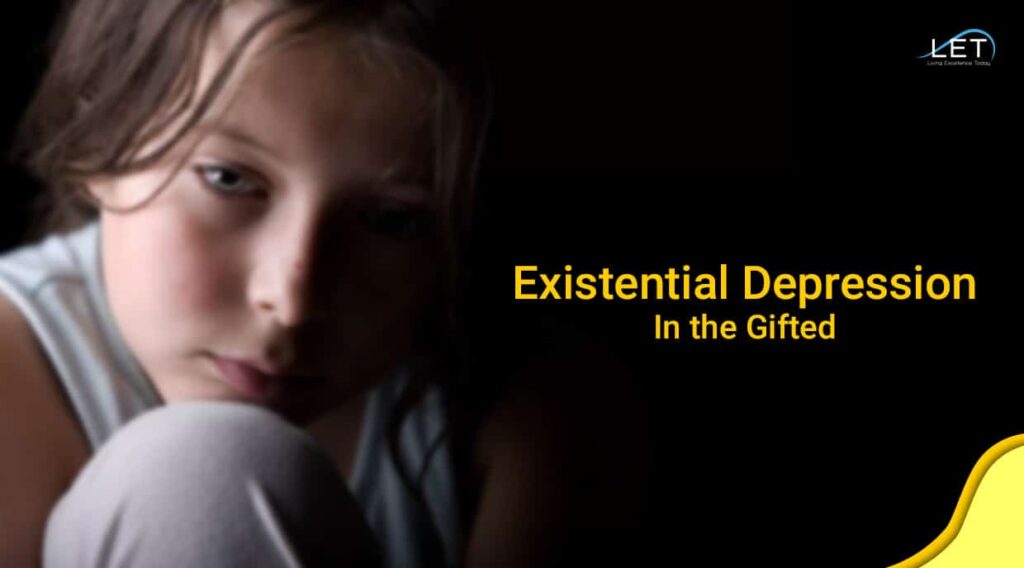Why Intelligent People Suffer from Existential Depression?
By Gurpreet Kaur, Ed.D.
What is Existential Depression?
When one goes through a trauma–a death of a loved one, a job loss, natural disaster, for example-it is understandable that the individual experiences distress because her life and the world disintegrates. The person might become sad, despaired, angry, and even bitter towards life. Things don’t have the same meaning that was there before a traumatic event. The person might feel lost and confused due to the ambiguity in life. The transient nature of life and lack of control makes the person question meaning and purpose of life. This type of distress or depression is called existential depression.
However, the gifted children, adolescents, and adults are more prone to this type of depression without experiencing any existential challenges or traumatic events. More often than not in my practice, I hear the presenting problem, “Something is missing.” These individuals are usually young adults in their late 20’s and 30’s. They are bright, hard working, idealists, achieved success, and earn good money, but feel some sort of void inside that they cannot ignore by this age.
Gifted Children
 This type of emptiness is not only experienced by this age group, I have worked with as young as 9-year-old kids contemplating the meaning of life, life purpose, why do we what we do, why do I need to study, does “heaven or the opposite” exist? Upon, mom’s request, I decided to have the initial consultation with this 9-year-old who wanted to talk about “heaven and the opposite of it” along with the curiosity around what happens after we die. It was very cute that he would not even say the word hell. I usually don’t work with children under age 13, but I make such exceptions when I know the child might be emotionally matured and can benefit from my approach and services. When you’re working with gifted kids, age can be deceiving because of the asynchronous development, which means these kids usually don’t follow the typical developmental stages and accelerate through them. Bright kids can experience existential depression as early as age 5. Parents reading this blog; please don’t ignore these big life questions from your little bright minds.
This type of emptiness is not only experienced by this age group, I have worked with as young as 9-year-old kids contemplating the meaning of life, life purpose, why do we what we do, why do I need to study, does “heaven or the opposite” exist? Upon, mom’s request, I decided to have the initial consultation with this 9-year-old who wanted to talk about “heaven and the opposite of it” along with the curiosity around what happens after we die. It was very cute that he would not even say the word hell. I usually don’t work with children under age 13, but I make such exceptions when I know the child might be emotionally matured and can benefit from my approach and services. When you’re working with gifted kids, age can be deceiving because of the asynchronous development, which means these kids usually don’t follow the typical developmental stages and accelerate through them. Bright kids can experience existential depression as early as age 5. Parents reading this blog; please don’t ignore these big life questions from your little bright minds.
Why the Gifted Individuals Are More Prone to Existential Depression?
Highly Intellectual people are usually more intense, sensitive, perfectionist, idealist, and intuitive. Combine these sensitivities with their brightness, and you have a recipe for existential depression. These individuals can see the discrepancies and absurdities in others. The sensitivities make them care and become aware of the things that are “wrong” with the world, society, them, friends, and family even. They can feel the vastness of the universe and their tiny role in it. They feel small and helpless to solve the things they see “wrong” around them. They start to ask the big and difficult questions about the meaning and purpose of life. You can see how all this helplessness can lead to depression. These individuals become sad and depressed because they feel disappointed when they become aware of how the world is not the way they thought it would, should, or could be.
Action Step
What can you do as a gifted adult about these feelings? It is important to look for these alarming signs. Please do not ignore the sadness, despair, and disappointments you feel about our world and people around you. Please don’t get drowned in this sadness. Let’s not have another Robin Williams. There is help available and you can overcome this ordeal. Check out this blog post if you are unsure if Mental Health Counseling is for you. If you’re a parent and reading this article, please don’t ignore those big questions your child is asking you. There is a reason. In fact some of their anxiety, depression, social and other challenges can be due to the lack of framework for those big questions. Look out for next post for some steps to take towards helping yourself or your loved one.
Dr. Gurpreet Kaur is a Licensed Professional Counselor, Certified Clinical Mental Health Counselor, Life Coach, Speaker, and an Author. Dr. Kaur is very passionate about self-love, self-empowerment, wellness, reaching the full potential, and quantum mechanics principles application in life. She helps her clients develop a solid self-care mindset so they can heal their relationships and build emotional resiliency. Dr. Kaur is an Entrepreneur Leadership Network Contributor and Executive Contributor for Brainz Magazine.
